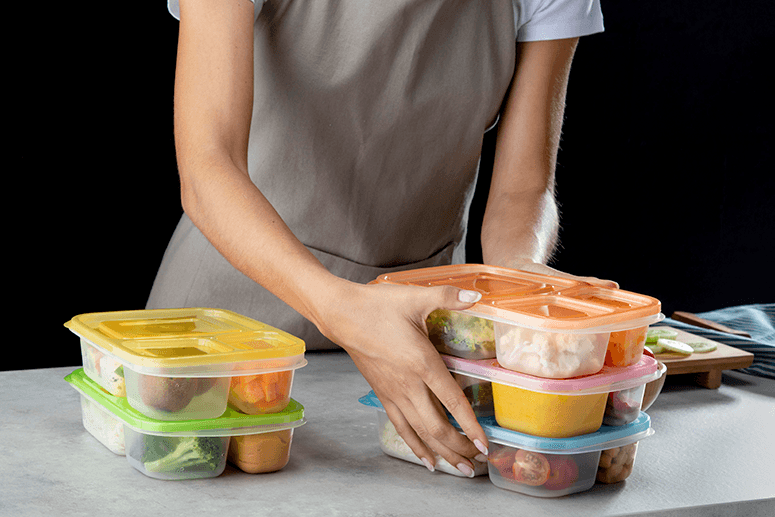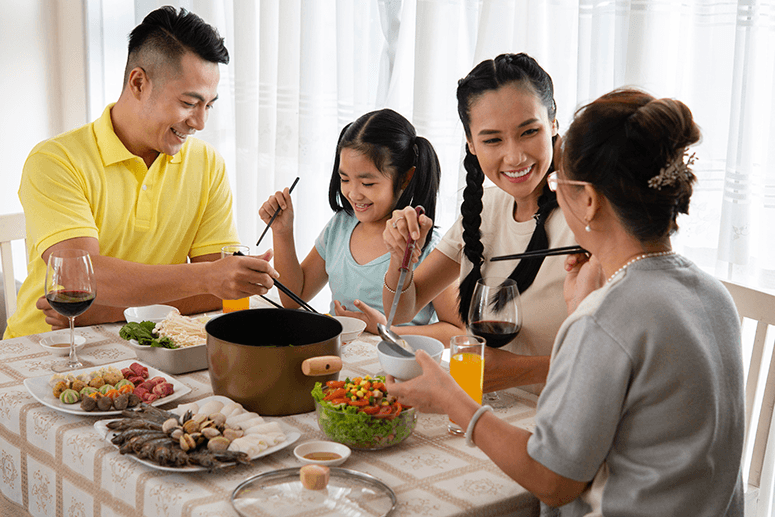Did hustle culture ruin our relationship with food?
For the past year, the work I put into meal prepping has been a badge of honor I’ve held close to my heart. As a college student living alone, I found it the most cost- and labor-efficient way to fuel myself as I fire through the demands of academics, work, organizations, and relationships.
I would cook my meals on weekends en masse and portion them into 16 containers; these were then frozen and kept for the week. At lunch and dinnertime, alone in my apartment, I would simply pop one into the microwave, the end result of which is an irradiated remnant of yesterday. They say there’s comfort in familiarity, although I doubt they’ve eaten the same viand for the past four days. Still, I thought, my microwave’s repetitive monotonous buzz was a reminder of my own efficiency and productivity—virtues in themselves in the age of self-optimization.
But lately, I have been slowly getting rid of the plastic containers that I’ve accumulated over the months.

Did meal prep save me time? A ton. As ludicrous as it may sound, I was once so knee-deep into hustle culture that I thought the things that surviving necessitates—e.g. eating, sleeping, excreting—were nothing but a hassle. I’d rather be doing productive things, by which I meant things that are monetizable or could be monetized in the far future. I dreaded cooking one meal at a time and the cleaning it entailed after. Indeed, the benefits of preparing them in advance are real: Not only did it open up my manically filled-out weekly calendar, but I was also freed from the mental obligation of having to figure out what I wanted to eat.
I certainly enjoyed bragging about it. When I talk about the mounds of ready-to-eat meals I had in my fridge, what I was actually saying was that I was so busy I couldn’t be bothered to make menial decisions. Food, in this framing, is reduced to simply a means to an end: mere sustenance so my body could keep up with the impositions, both real and self-inflicted, of the hustle culture that plagues us.
But at what cost? I fancy myself a good cook and I genuinely enjoy my cooking. But after a day or two, my dishes become uninspiring, depressing mush. Recently on a Thursday afternoon, after unsuccessfully forcing myself to finish five-day-old chicken teriyaki and rubbery string beans, a jolt of laughable disenchantment hit me.
A quick #mealprep search on TikTok or Instagram conjures creators and self-help gurus swearing by the promises of bulk, streamlined preparation. Some do it for weight loss, others mostly to save time. In short, it’s almost always a response to societal expectations.
“In this day & age we all lead such busy and hectic lifestyles,” begins an Instagram user monikered “the meal prep queen.” “The more we can implement daily to keep ourselves organized & on track, the more it takes some of that stress off.”
I’m reminded of a passage from Jia Tolentino’s essay Always Be Optimizing. On the efficiency of chopped salads, she writes: “The worse things get, the more a person is compelled to optimize.”

Tracing when my own compulsion to cut corners began, I was brought back to the latter years of high school. The commute to my early morning class took two hours and I often missed my breakfast: Meal prep was easily the panacea. As I entered college and felt the need to catch up on everyone doing internships and applying for grants and winning awards, eating and resting were the first to be brushed to the sidelines.
And I am not alone in this. In our household, food has become an afterthought. My mother’s kare-kare used to be prepared using beef shank pressure-cooked and seasoned with peanut paste. As a child, I would grind peanuts using our marble mortar and pestle, while my mother soaked annatto seeds in the freshly skimmed tallow. Nowadays, as if the time saved using a pressure cooker wasn’t enough, we’ve resorted to instant mixes. At least Mama Sita’s mix is made with real peanuts, or so the packaging says.

Even the actual act of eating has not survived the calls for efficiency. Every time I visit my parent’s house, I marvel at the fact that it’s been a long time since we paused from work to eat together. “It’s like we’re just housemates,” I recently joked to my sister, alluding to the fact that everyone was marooned in their own corner. Personally, I’ve always eaten hastily—a high school classmate was aghast seeing how I could eat rice meals while brisk walking. But since having learned to attach my self-worth to my busyness, I’ve policed myself to maximize and streamline both the grand and banal: The guilt that comes with slowing down became a more and more visceral feeling I’d find in all aspects of my life.
A semester into university in 2020, I filed to take a gap year because “spending this valuable yet fleeting period of my life merely in front of a monitor is the last thing I imagined to happen,” I wrote to our academic affairs dean. Many thought it was indulgent, a sign of privilege. At the time, I was, quite defensively, heralding Audre Lorde’s line that “self-care is an act of political warfare.” Behind the scenes, though, no real self-care was happening. I was working freelance for a magazine on top of a full-time job, which I later quit to do two simultaneous internships.

Under capitalism, it seems any attempt to subvert the demands of an unhinged busy life always ends up eroticizing capital. Think of the gig economy and flexiwork, which celebrates the idea of every waking moment being time you could spend working; life has become so precarious that extra income is always sought and appreciated. I’m also reminded of the CEO of the startup I interned for, a woman in her mid-thirties, the epitome of a girlboss. She takes pride in her bouts of rest and athleticism because, she said, it energizes her to do more work. Capitalism has become so inescapable that acts of resistance are bound to fall within its terms.
Since I stopped meal prepping, I have taken strides to eat intentionally with and around friends. Eating as a social contemplative space, if you will. I recently ate at a fast food chain at Glorietta, close to the end of the mall hours, with a guy I had been dating. Rowdy banters, inside jokes, and work lamentations filled the room, as workers from the business district swarmed to and fro. I didn’t mind as I was deeply preoccupied with my Y1 meal I wished was a C3, and the conversation I was having with him. Biting into the burger, the quintessential fast-food item, I reckoned that the impulse of self-optimization is something I’ll be walking away from for the rest of my life. But right then and there, amidst the abundance of people and food I hadn’t eaten in a long while, I felt alive.


